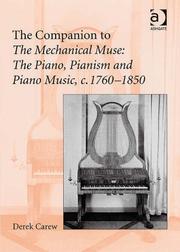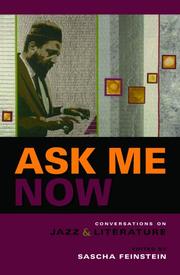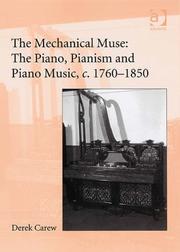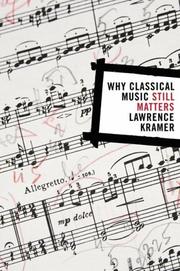| Listing 1 - 6 of 6 |
Sort by
|

ISBN: 1315614898 1317037669 1317037650 1281208388 9786611208387 075468671X 9780754686712 9781317037651 9781281208385 6611208380 9781317037668 9780754663119 0754663116 Year: 2007 Publisher: Aldershot, Hampshire, England Burlington, VT Ashgate
Abstract | Keywords | Export | Availability | Bookmark
 Loading...
Loading...Choose an application
- Reference Manager
- EndNote
- RefWorks (Direct export to RefWorks)
This Companion is intended as a supplement to The Mechanical Muse: The Piano, Pianism and Piano Music, c.1760-1850. The book is laid out alphabetically and full biographical entries are provided for all musical figures mentioned, including composers, performers, theoreticians and teachers, as well as piano makers and publishers of music, within the period covered by The Mechanical Muse. As well as biographical information, entries contain lists of principal works, a section on further reading, descriptions of musical forms and characteristics of dances. This Companion is indispensable to users
Book
ISBN: 9782705666644 2705666648 Year: 2007 Publisher: Paris Hermann
Abstract | Keywords | Export | Availability | Bookmark
 Loading...
Loading...Choose an application
- Reference Manager
- EndNote
- RefWorks (Direct export to RefWorks)
Piano music --- Piano --- History and criticism --- Performance --- Badura-Skoda, Paul.
Periodical
Abstract | Keywords | Export | Availability | Bookmark
 Loading...
Loading...Choose an application
- Reference Manager
- EndNote
- RefWorks (Direct export to RefWorks)
Jazz --- Jazz musicians --- Musiciens de jazz --- History and criticism --- Histoire et critique --- Accordion and piano music (Jazz) --- Clarinet and piano music (Jazz) --- Cornet and piano music (Jazz) --- Double bass and piano music (Jazz) --- Jazz duets --- Jazz ensembles --- Jazz music --- Jazz nonets --- Jazz octets --- Jazz quartets --- Jazz quintets --- Jazz septets --- Jazz sextets --- Jazz trios --- Jive (Music) --- Saxophone and piano music (Jazz) --- Vibraphone and piano music (Jazz) --- Wind instrument and piano music (Jazz) --- Xylophone and piano music (Jazz) --- Musicians --- African Americans --- Music --- Third stream (Music) --- Washboard band music --- Jazz. --- Jazz musicians.

ISBN: 9780253349514 9780253218766 Year: 2007 Publisher: Bloomington Indiana university press
Abstract | Keywords | Export | Availability | Bookmark
 Loading...
Loading...Choose an application
- Reference Manager
- EndNote
- RefWorks (Direct export to RefWorks)
785.161 --- 820-1 "19" --- 82:7 --- Muziek voor jazzbands. Jazzmuziek --- Engelse literatuur: poëzie--20e eeuw. Periode 1900-1999 --- Literatuur en kunst --- 82:7 Literatuur en kunst --- 820-1 "19" Engelse literatuur: poëzie--20e eeuw. Periode 1900-1999 --- 785.161 Muziek voor jazzbands. Jazzmuziek --- Jazz in literature --- Jazz --- Accordion and piano music (Jazz) --- Clarinet and piano music (Jazz) --- Cornet and piano music (Jazz) --- Double bass and piano music (Jazz) --- Jazz duets --- Jazz ensembles --- Jazz music --- Jazz nonets --- Jazz octets --- Jazz quartets --- Jazz quintets --- Jazz septets --- Jazz sextets --- Jazz trios --- Jive (Music) --- Saxophone and piano music (Jazz) --- Vibraphone and piano music (Jazz) --- Wind instrument and piano music (Jazz) --- Xylophone and piano music (Jazz) --- African Americans --- Music --- Third stream (Music) --- Washboard band music

ISBN: 9780859679695 9780754663119 0859679691 9781315085968 9781351542661 9781138260511 Year: 2007 Publisher: Aldershot Ashgate
Abstract | Keywords | Export | Availability | Bookmark
 Loading...
Loading...Choose an application
- Reference Manager
- EndNote
- RefWorks (Direct export to RefWorks)
Intended as a supplement to The Mechanical Muse: The Piano, Pianism and Piano Music, c.1760-1850, this Companion provides additional information which, largely for reasons of space but also of continuity, it was not possible or desirable to include in that volume. The book is laid out alphabetically and full biographical entries are provided for all musical figures mentioned, including composers, performers, theoreticians and teachers, as well as piano makers and publishers of music, within the period covered by The Mechanical Muse. There are also entries on figures of importance from outside the period but whose influence is palpably important within it, such as J.S. Bach. As well as biographical information, all these entries contain lists of principal works and a section on further reading so that readers can follow up people and matters of particular interest. Also included in The Companion are entries devoted to particular works and other information of relevance, such as descriptions of musical forms, characteristics of dances and so on, as well as some technical information on music and explanations of technical terms pertaining to keyboard instruments themselves and to ways of playing them. This Companion is not intended to replace existing reference books such as Grove or Musik in Geschichte und Gegenwart, but will be useful for those who desire to know more about a particular topic and do not necessarily have access to more specialist reference works, or time to visit large or specialist libraries. As such it is indispensable to users of The Mechanical Muse.
piano's --- muziekinstrumentenbouw --- Music --- muziekinstrumenten --- pianobouw --- pianomuziek --- anno 1700-1799 --- anno 1800-1899 --- Piano music --- Piano --- Piano, Musique de --- History and criticism. --- History. --- Histoire et critique --- Histoire --- 530 --- 517 --- Muziekwetenschappelijke essays --- Uitvoeringspraktijk --- 78.47 --- Piano music (2 hands) --- Recorded accompaniments (Piano) --- History and criticism --- History --- 524 --- Muziekgeschiedenis (Romantiek)

ISBN: 1281752479 9786611752477 1429471816 0520933648 1433709678 9780520933644 9781429471817 9781433709678 9781281752475 9780520250826 0520250826 Year: 2007 Publisher: Berkeley, Calif. ; London : University of California Press,
Abstract | Keywords | Export | Availability | Bookmark
 Loading...
Loading...Choose an application
- Reference Manager
- EndNote
- RefWorks (Direct export to RefWorks)
"What can be done about the state of classical music?" Lawrence Kramer asks in this elegant, sharply observed, and beautifully written extended essay. Classical music, whose demise has been predicted for at least a decade, has always had its staunch advocates, but in today's media-saturated world there are real concerns about its viability. Why Classical Music Still Matters takes a forthright approach by engaging both skeptics and music lovers alike. In seven highly original chapters, Why Classical Music Still Matters affirms the value of classical music-defined as a body of nontheatrical music produced since the eighteenth century with the single aim of being listened to-by revealing what its values are: the specific beliefs, attitudes, and meanings that the music has supported in the past and which, Kramer believes, it can support in the future. Why Classical Music Still Matters also clears the air of old prejudices. Unlike other apologists, whose defense of the music often depends on arguments about the corrupting influence of popular culture, Kramer admits that classical music needs a broader, more up-to-date rationale. He succeeds in engaging the reader by putting into words music's complex relationship with individual human drives and larger social needs. In prose that is fresh, stimulating, and conversational, he explores the nature of subjectivity, the conquest of time and mortality, the harmonization of humanity and technology, the cultivation of attention, and the liberation of human energy.
Music --- Musical analysis. --- Analysis, Musical --- Analytical guides (Music) --- Hermeneutics (Music) --- Music analysis --- Music theory --- Music appreciation --- Musical aesthetics --- Aesthetics --- Philosophy and aesthetics. --- Analysis, appreciation --- Analytical guides --- Instruction and study --- Philosophy --- 18th century. --- academic. --- apologists. --- chopin. --- classical composers. --- classical music. --- classical musicians. --- composers. --- gershwin. --- human nature. --- johann sebastian bach. --- johannes brahms. --- love song. --- media. --- mozart. --- music lovers. --- music performance. --- music studies. --- musical composers. --- musical history. --- musicians. --- piano music. --- popular culture. --- ravel. --- scholarly. --- schubert. --- schumann. --- technology.
| Listing 1 - 6 of 6 |
Sort by
|

 Search
Search Feedback
Feedback About UniCat
About UniCat  Help
Help News
News